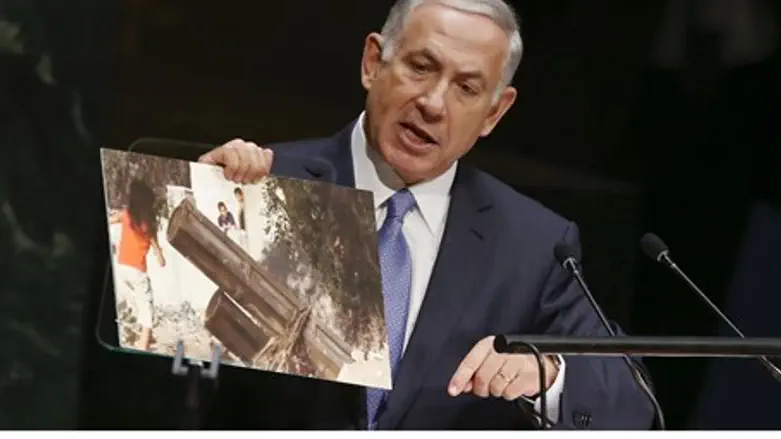
Arutz Sheva security analyst and UN correspondent Mark Langfan analyzed Binyamin Netanyahu’s speech at the United Nations on Monday, and said it “turned the world upside down” by requiring peace with Arabs first, before Israel makes peace with the Palestinians. This is a "historic" reversal of the previous order of things, he determined.
Netanyahu sees a burgeoning alliance between Israel and the more moderate Sunni states forming to face the radical elements in the Sunni and Shi'a worlds, Langfan explained.
Netanyahu explicitly mentioned “Riyadh” and “Cairo” as possible new allies, with underlying common strategic enemies and dangers, noted Langfan.
Six months ago, on April 2014, Langfan sketched out the outlines and possible strategic synergies in just such an alliance in his article, “MEATO: the Trans-Riyadh-Jerusalem-Athens Alliance.”
Langfan will hold a “Senate-side” talk on the subject of “Anti-Zionism, the New Anti-Semitism-the Strategic Threat to US Interests” under the auspices of Sarah Stern’s EMET, Endowment for Middle East Truth tomorrow, Wednesday, October 1, 2014 on Capitol Hill, Washington D.C.
The graphic power-point talk will focus on how today’s waxing anti-Zionism is a strategic threat, not only to US interests among the moderate Sunni Muslims, but also to Cyprus, the entire Mediterranean basin, and NATO.
Langfan will focus, among other issues, on the underlying strategic elements of the nascent alliance between Israel, and the moderate Sunni Arab countries surrounding it.
At the event, Langfan will explain with the help of his special-designed, 3-d topographic maps of Iran, Iraq and Syria where Iran’s nuclear facilities are located, and where ISIS was formed, has been focused, and where it may spread to next. Also, he will discuss over-the-horizon threats that face US interests in the Middle East.